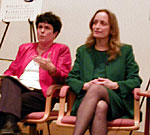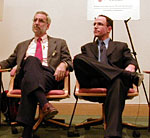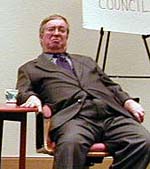By Marisa Helms
Minnesota Public Radio
October 23, 2001
|
| RealAudio |
The local chapter of the Society for Professional Journalists brought together some Twin Cities media executives Monday night in a forum at the University of Minnesota. They discussed the challenges of covering the September 11th attacks and the war on terrorism.
| |
|
|
|
||
About 175 people came to hear representatives from local print and television media. While the audience asked a few questions, it was the five panelists who mostly spoke during the nearly two hour forum.
Minneapolis Star Tribune reporter Eric Black said before the attacks the ratio of serious news to non serious news was changing for the worse. "All the sudden September 11th happened and the world matters and the news is serious, and if you've been in a newsroom, it's a whole different atmosphere," he said.
Star Tribune editor Tim McGuire agreed September 11th and its aftermath have re-established the importance of the news. But McGuire warned that continued access to information is at risk. He cited an October 12th memo by Attorney General John Ashcroft to agency leaders. Ashcroft directed them to interpret the Freedom of Information Act more strictly.
| |
|
|
|
||
The Freedom of Information Act, allows reporters and others to get unclassified government records that officials would not otherwise release.
It's sometimes called the sunshine law. McGuire says the Ashcroft memo runs counter to the intent of the law. "It's going to be incumbent upon the media to reinforce constantly that we do not know exactly what will grow from the sunshine except for the truth and I'm very concerned some people from the federal government are forgetting that" McGuire said.
Panelists talked about the First Amendment and how the media needs to fulfill its role as government watchdog. They all agreed there must be room for dissent, even during wartime.
Several panelists said they were concerned about the prevailing notion - even among their colleagues - that questioning the government is unpatriotic.
| |
|
|
|
||
Panelist Jane Kirtley, a professor of media ethics and law at the University of Minnesota, said in an open society, the more debate the better. "The free flow of information is what has made this country strong, it is what has made this country great, and is what has made this country unique, and anything that would compromise that, I think is wrong and I think it's the worst possible thing we could do," Kirtley said.
The panelists said the public has generally been interested in local news. The Star Tribune's Tim McGuire says before the attacks, most people paid little attention to reports about Osama bin Laden and the Taliban. "What you do is you publish news that has a connection to your readers. Increasingly, I do believe that this is going to have the positive effect of making Americans wake up to the fact that they are in a global world," he said.
The Star Tribune's pursuit of one story linking the Twin Cities to the wider world has angered some members of the local Somali community.
Several Somali nationals in the audience challenged Star Tribune editor McGuire over that story. The article said some members of the Somali community in Minnesota contributed money to a charity that President Bush says has links with Osama bin Laden.
McGuire defended the newspaper's treatment of the story. He said anybody with specific evidence of inaccuracy in the report should bring it to his attention.



